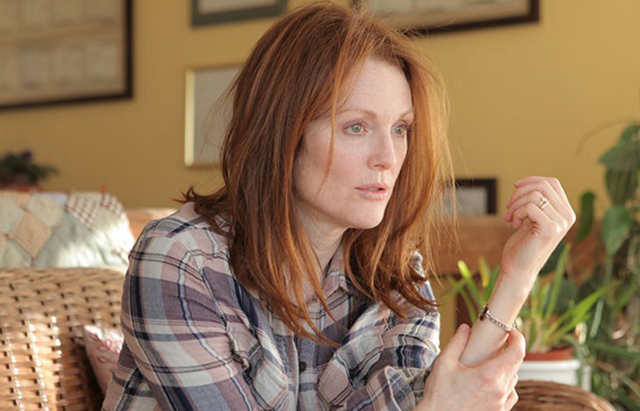CHICAGO – In anticipation of the scariest week of the year, HollywoodChicago.com launches its 2024 Movie Gifts series, which will suggest DVDs and collections for holiday giving.
Julianne Moore Delivers Shattering Portrayal in ‘Still Alice’
 Rating: 4.5/5.0 |
CHICAGO – In one of the best film acting performances from 2014, Julianne Moore devastatingly portrays a woman in her fifties who is a victim of early onset Alzheimer’s disease. As the effects of dementia physically deteriorates her life, it is a wonder if she is “Still Alice.”
The performance of Moore is brave, unforgiving and sympathetic, plus it’s also unerringly sad. As much as it’s a story of Alice, it is also a story of her family, who must endure the infamous double loss of Alzheimer’s – the disintegration of the essence of their loved one, and their eventual physical demise. Alec Baldwin and Kristen Stewart (“Twilight”) represent the family with virtually no tears, as their choices regarding Alice are faced by thousands of families every year. Although difficult to experience, “Still Alice” provides a glimpse into an inevitability in most people’s lives, and is a cinematic shorthand for how and what happens to a victim of their own biology.
Alice (Julianne Moore) is a highly regarded linguistics professor, blessed with a happy life through her husband John (Alec Baldwin) and three grown children (Hunter Parrish, Kate Bosworth and Kristen Stewart). During a lecture, she finds herself forgetting key and long-entrenched elements of her syllabus. While perplexing, initially it’s not so alarming.

Contemplation of Fate: Julianne Moore in ‘Still Alice’
Photo credit: Sony Pictures Classics
As her forgetfulness progresses, her distress and frustration increases. When she gets lost in her hometown while jogging, she begins memory testing, and the unfortunate diagnosis is early onset Alzheimer’s disease. The next several years for Alice is a slow descent into mental chaos, and her family must begin the painful process of dealing with her circumstance.
The great thing about Julianne Moore is both the subtlety and courage she gives to Alice. Because the character is a PhD academic, she is used to systematically applying knowledge to goal orientation, so there are some fascinating experiments she does – including a video instruction to herself – that makes this story a little different than expected. Also, Moore’s still-beautiful youthfulness belies the stereotype of a shaken older victim of the disease. It’s heartbreaking and empathetic, two traits that Moore is able to exemplify in the role.
The supporting cast is deceptively superior, because the adapted script and co-direction – by Richard Glatzer and Wash Westmoreland – chooses to make the family upper middle class bland at first, and challenges them to react to the disease in progress. Alec Baldwin is the epitome of this characteristic, and both his hope and pragmatism remind us how delicate an actor he can be. And Kristen Stewart evolves her character throughout the story, and concludes with an achingly poignant confrontation with her mother.
There is apparent careful research in the source novel and script, as the steps that Alice goes through are never exploitative, but truthful in their expression. Key to all that is a mid-story speech that the academic Alice gives to a research organization, meticulous in its set-up and amazingly heroic in its delivery. Moore has been cleaning up on the awards circuit this season, but the performance goes beyond that sort of recognition, into a more spiritual realm.

Daughter and Mother: Kristen Stewart and Julianne Moore in ‘Still Alice’
Photo credit: Sony Pictures Classics
I cannot imagine, having not seen a loved go through severe dementia up close, what this will mean to those who have endured it. I would suspect it would be cathartic, in the memory of those who are lost to that cloud. There was a documentary last year about the singer Glen Campbell – suffering from Alzheimer’s Disease – entitled “Glen Campbell: I’ll Be Me.” The film acts as a reality companion piece to “Still Alice,” with each providing a different angle to the disease, and each generating a type of truth in their own way.
And one other observation – the film reminds us that we’re all terminal cases, and the fate of our genetics, biology and sheer luck determine how the health quality of our lives will be lived. Like a target game at a carnival, who stays up and who goes down is a matter of chance and cosmic inches.
 | By PATRICK McDONALD |


